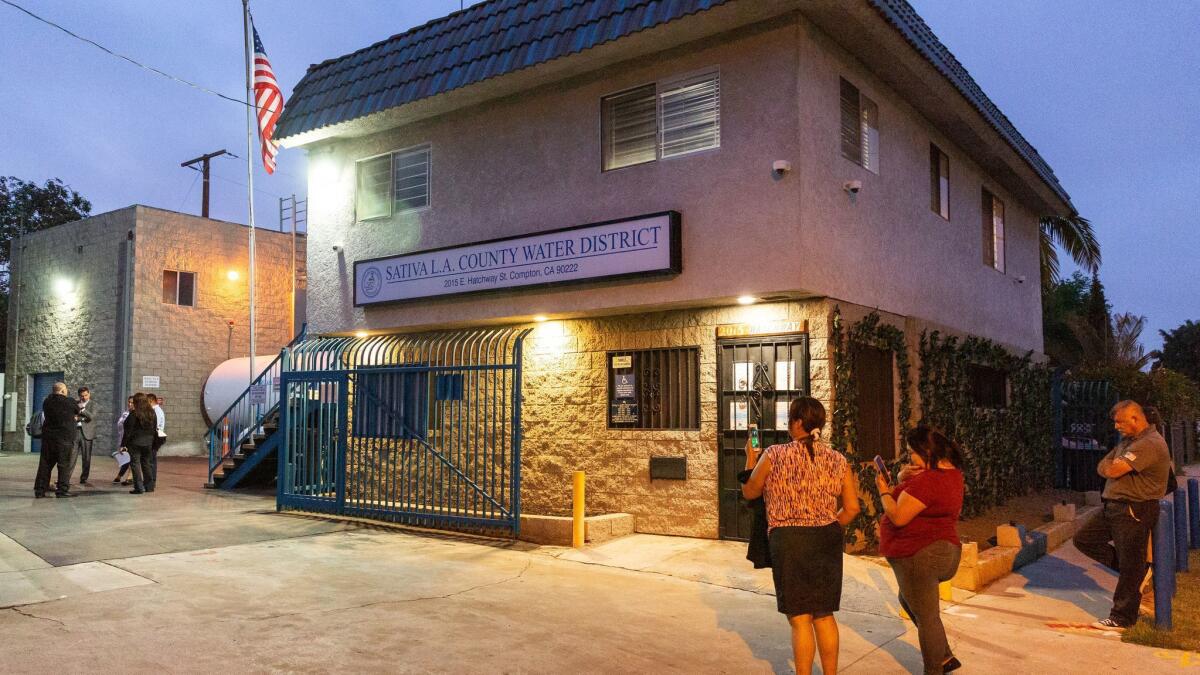Compton district that served ‘disgusting’ drinking water will cease to exist

Authorities voted Wednesday to disband a tiny water district in Compton that for years had been distributing discolored, putrid drinking water to its customers.
L.A. County’s Local Agency Formation Commission, which oversees public water districts, unanimously decided that Sativa Los Angeles County Water District should cease to exist due to mounting allegations of poor maintenance, financial malfeasance and lack of transparency. The county’s Department of Public Works, which had been appointed to manage Sativa on an interim basis after the state took it over last year, will assume full control of the district.
The decision paves the way for the county to shift ownership and operations of the locally controlled public water district, possibly to a private, investor-owned utility company.
Daniel Lafferty, an engineer at the county’s Department of Public Works, said at Wednesday’s meeting that allowing a private owner to absorb the 1,600 homes Sativa serves might be the best way to repair the district’s aging pipes and infrastructure without passing on millions of dollars in costs to its predominantly low-income customers, who currently pay a flat rate of about $65 a month.
“The one benefit of having a private entity is a larger customer base,” Lafferty said. “The cost incurred can be spread across the rest of the customer base.”
It was long believed that Sativa’s ailing pipelines were responsible for delivering manganese into the water supply and tinging the water brown. But after county officials performed a rapid assessment of the water district, they now believe the source actually might be the wells that supply groundwater to customers.
“All the testing we’ve done indicates the water is safe,” Lafferty testified to the commission. “It’s disgusting, but safe.”
The inferior water quality has raised questions of environmental injustice and whether complaints go ignored in poorer communities and communities of color, such as the one served by Sativa. Sativa serves customers in largely black and Latino neighborhoods, many of them elderly and living paycheck to paycheck.
Gov. Gavin Newsom said during his first State of the State address Tuesday that the number of communities without clean drinking water is a “moral disgrace and a medical emergency” and added that “solving this crisis demands sustained funding.”
For years, Sativa customers reported brown, and at times smelly, water flowing from their faucets. The district’s five-member elected board responded by flushing the system or ordering customers to run all their taps until the water flowed clean.
Eddie Mae Lamon, 88, said she has been experiencing brown water since she moved to Willowbrook in the 1950s, but it has gotten increasingly worse over the last decade.
Fed-up customers took their frustrations to social media, which caught elected officials’ attention. Various government agencies banded together to craft a solution.
Last year, then-Gov. Jerry Brown signed into law Assembly Bill 1577, which allowed the state to remove elected board members and appoint L.A. County to take over Sativa. The governor’s action marked the first time that the State Water Resources Control Board had taken over a water district.
Two days after the county stepped in, the water district’s phones were disconnected because the district had fallen behind on paying its phone bill and barely had enough money to cover other expenses. The county approved a $1.4-million line of credit to get the district on stable financial footing.
Additionally, the county found a lack of financial controls and failure to maintain financial records. As they comb through the bank statements, officials said, they are forwarding suspicious charges to be investigated by the district attorney’s office.
“Anything that does not pass the smell taste or at all looks inappropriate is being referred to the D.A.,” said Paul Novak, the Local Agency Formation Commission’s executive officer.
Wednesday’s meeting lacked the large crowds and jubilation that was expressed last July when the commission was weighing the water district’s future. This time, three people spoke during the period for public comment.
Lamon, a Sativa customer, said she worries that customers would lose control and protections over their water if the district is sold to a private company. Tony Hicks, 66, expressed concerns about possible rate hikes. Both Lamon and Hicks sat on Sativa’s board in the 1990s. Mark Ravis, a lawyer who represented some Sativa customers in a civil lawsuit, echoed Hicks’ sentiments.
“We want a moratorium on rates,” Ravis said.
After the vote, the commissioners discussed possible options, such as legislation to keep rates affordable.
More to Read
Sign up for Essential California
The most important California stories and recommendations in your inbox every morning.
You may occasionally receive promotional content from the Los Angeles Times.











